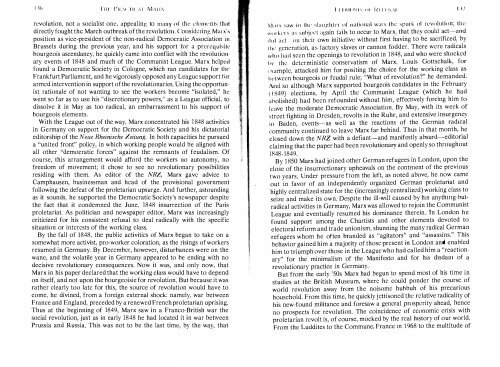CONTENTS - ouroboros ponderosa
CONTENTS - ouroboros ponderosa
CONTENTS - ouroboros ponderosa
Create successful ePaper yourself
Turn your PDF publications into a flip-book with our unique Google optimized e-Paper software.
1'111 " IL\( 'II( ,\ 1 MAle,<br />
revolution, not a socialist one, appealing to many of the deml'nts thai<br />
directly fought thc March outbreak of the revolutioll. (:ollsidcring Malxs<br />
position as vice-president of the non-radical Democratic Association in<br />
Brussels during the previous year, and his support ttlr a prerequisite<br />
bourgeois ascendancy, he quickly camc into conflict with the revolutionary<br />
events of 1848 and much of the Communist League. Marx helped<br />
found a Democratic Society in Cologne, which ran candidates for till'<br />
Frankfurt Parliament, and he vigorously opposed any League support t(,r<br />
armed intcrvention in support of the revolutionaries. Using the opportunist<br />
rationale of not wanting to see the workers become "isolated," he<br />
went so far as to use his "discretionary powers," as a League official, to<br />
dissolvc it in May as too radical, an embarrassment to his support of<br />
bourgeois elements.<br />
With the League out of the way, Marx concentrated his 1848 activities<br />
in Germany on support for thc Dcmocratic Society and his dictatorial<br />
editorship of the Neue Rheinische Zeitung. In both capacities he pursued<br />
a "united front" policy, in which working people would be aligned with<br />
all other "democratic forces" against the remnants of feudalism. Of<br />
course, this arrangement would afford the workers no autonomy, no<br />
freedom of movement; it chose to see no revolutionary possibilities<br />
residing with them. As editor of the NRZ, Marx gave advice to<br />
Camphausen, businessman and head of the provisional government<br />
following the defeat of the proletarian upsurge. And further, astounding<br />
as it sounds, he supported the Democratic Socicty's newspaper despite<br />
the fact that it condemned the June, 1848 insurrection of the Paris<br />
proletariat. As politician and newspaper editor, Marx was increasingly<br />
criticized for his consistent refusal to deal radically with the specific<br />
situation or interests of the working class.<br />
By the fall of 1848, the public activities of Marx began to take on a<br />
somewhat more activist, pro-worker coloration, as the risings of workers<br />
resumed in Germany. By December, however, disturbances were on the<br />
wane, and the volatile year in Germany appeared to be ending with no<br />
decisive revolutionary consequences. Now it was, and only now, that<br />
Marx in his paper declared that the working class would have to depend<br />
on itself, and not upon the bourgeoisie for revolution. But because it was<br />
rather clearly too late for this, the source of revolution would have to<br />
come, he divined, from a foreign external shock: namely, war between<br />
France and England, preceded by a renewed Freneb proletarian uprising.<br />
Thus at the beginning of 1849, Marx saw in a Franco-British war the<br />
social revolution, just as in early 1848 he had located it in war between<br />
Prussia and Russia. This was not to be the last time, by the way, that<br />
I I I ' 1\.1 i 'NT', ()I, 1{I I IIS.'1<br />
r\,Lt IX S;\W ill till' slaughter of lIatiolial wars the spark of rcvulutiun; thl<br />
WI JlKl"rS as suhject again fails to occur to Marx, that they could act--anu<br />
.t ,d ad Oil thcoil own initiative without first having to be sacrificed, by<br />
ItlC generation, as factory slaves or cannon fodder. There were radicals<br />
wilo had seen the openings to revolution in 1848, and who were shocked<br />
t 'v the deterministic conservatism of Marx. Louis Gottschalk, for<br />
example, attacked him for positing the choice for the working class as<br />
t[("tween bourgeois or feudal rule; "What of revolution?" he demanded.<br />
Alld so although Marx supported bourgeois candidates in the February<br />
( t 49) elections, by April the Communist League (which he . had<br />
;,t)olished) had been refounded without bim, effecllvely forClllg hIm to.<br />
leave the moderate Democratic Association. By May, WIth Its week of<br />
street fighting in Dresden, revolts in the Ruhr, and extensive insurgency<br />
ill Baden, events-as well as the reactions of the German radIcal<br />
community continued to leave Marx far behind. Thus in that month, e<br />
closed down the NRZ with a defiant-and manifestly absurd-edltonal<br />
claiming that the paper had been revolutionary and openly so throughout<br />
1848-1849.<br />
By 1850 Marx had joined other German refugeesin London, upon the<br />
close of the insurrectionary upheavals on the contlilent of the prevIous<br />
two years. Under pressure from the left, as noted above, he now came<br />
out in favor of an independently organized German proletanat and<br />
highly centralized state for the (increasingly centralized) working c1ass to<br />
seize and make its own. Despite the ill-WIll caused by hIS anythlllg-but<br />
radical activities in Germany, Marx was allowed to rejoin the Communist<br />
League and eventually resumed his dominance therein. In London he<br />
found support among the Chartists and other elements devoted to<br />
electoral reform and trade unionism, shunning the many radical German<br />
refugees whom he often branded as "agitators': and uassassins." This<br />
behavior gained him a majority of those present III Londn an enabled<br />
him to triumph over those in the League who had called hIm a reactIon<br />
ary" for the minimalism of the Manifesto and for hIS dlsdalll of a<br />
revolutionary practice in Germany.<br />
But from the early '50s Marx had begun to spend most of his time in<br />
world revolution away from the noisome huhbuh of his precarious<br />
studies at the British Museum, where he could ponder the course of<br />
household. From this time, he quickly jettisoned the relative radicality of<br />
his new-found militance and foresaw a general prosperity ahead, bence<br />
no prospects for revolution. The coincidence of economic crisis with<br />
proletarian revolt is, of course, mocked by the real hIstory of ou: world.<br />
From the Luddites to the Commune, France III 1968 to the multItude of<br />
t \ /






